Big Blue World
The Global Newsletter of the Society for Underwater Technology




Issue 7, March 2023









The Global Newsletter of the Society for Underwater Technology




Issue 7, March 2023








Welcome to the first issue of Big Blue World for 2023! I’m delighted to be able to write this welcome as the recently appointed chair of the SUT Aberdeen Branch, which comes after seven years of involvement in the branch committee and a few years before that enjoying attending local events. I’ve also been involved in the SUT Council for past four years and you may recognise my voice (well-suited for night time radio) from the SUT’s Underwater Technology Podcast
I’m pleased to say that the year so far has been very busy getting back to the business of what the SUT does best – promoting knowledge sharing and learning in ocean industries through courses and events.
In January the SUT held it’s incredibly popular two-day course ‘An Introduction to Offshore Geophysics & Geotechnical Engineering’ at the University of Southampton. This fully-booked course was a huge success, with lectures, practical elements and hands-on lab testing.
London South East branch delivered a virtual course on Offshore Wind Renewable Energy. This was very well attended and is very much an area that the SUT can provide benefit to the underwater technology community through being able to bring together expertise to advance learning in the world of energy transition.
Aberdeen branch saw a return of the in-person Business Breakfast, titled “Opportunities in an Imperfect Storm”. Respected industry analysts shared insight into how the offshore energy industry can prosper following Covid restrictions, and more recent challenges such as issues in Ukraine and global pressures to restrict exploration.
All branches are continuing to plan and hold in-person events in parallel with webinars. It is great to see a returning appetite for in-person events with opportunity for direct engagement between audience and speakers. Maintaining a programme of webinars despite now being able to meet in person is helping to increase the global reach of the Society.
February saw the return of the Subsea Expo exhibition and conference in Aberdeen and Oceanology International in San Diego. It was great to see both events back to pre-covid levels, both for attendees and exhibitors not to mention an excellent conference programme.
Recent news that the High Seas Treaty has been agreed following 10 years of negotiations is a massive step to safeguard the natural marine environment. What will be key for the SUT in light of this is how the Society can continue to promote ocean industries and the blue economy, while helping to support key aspects of this historic treaty.
I’m very much looking forward to the year ahead and seeing what the SUT can continue to achieve as a global learned society. From the point of view of the recently appointed Aberdeen chair, I’m particularly looking forward to working with the team to deliver an excellent programme of courses, events and projects, and helping to make the SUT a very useful but also fun Society in which to be involved.
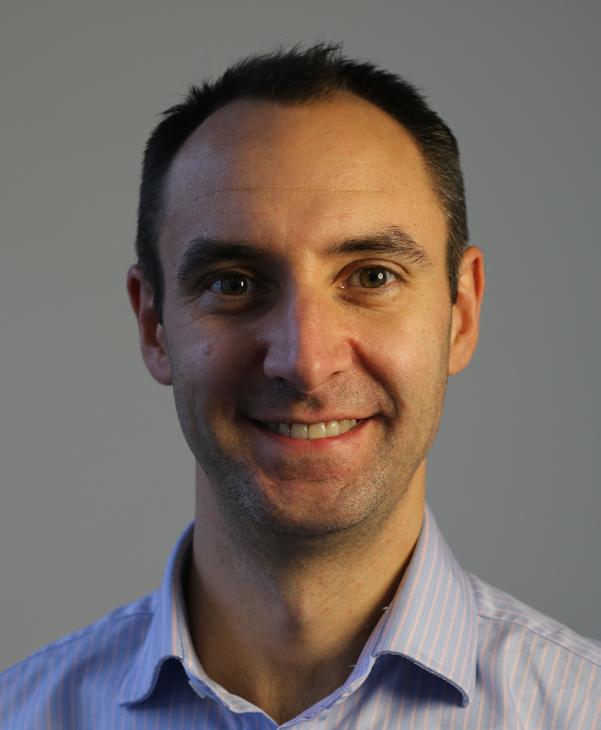 Andrew Connelly
Andrew Connelly





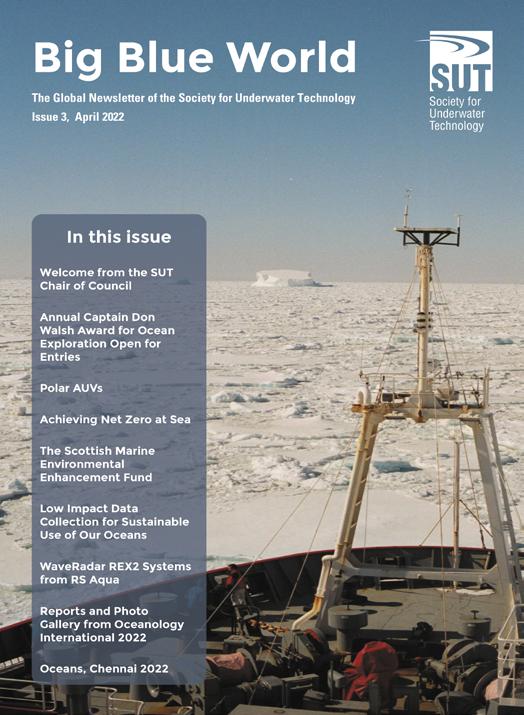

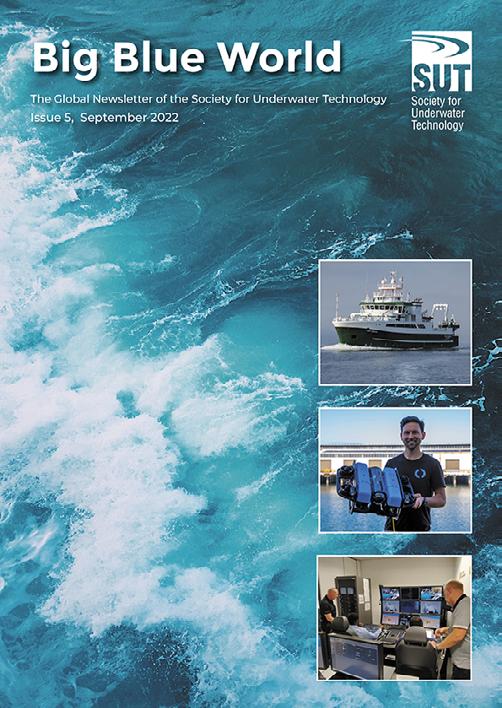
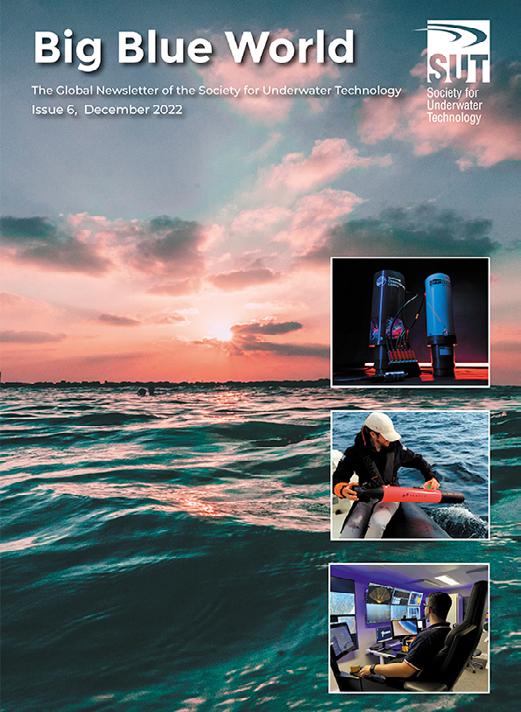
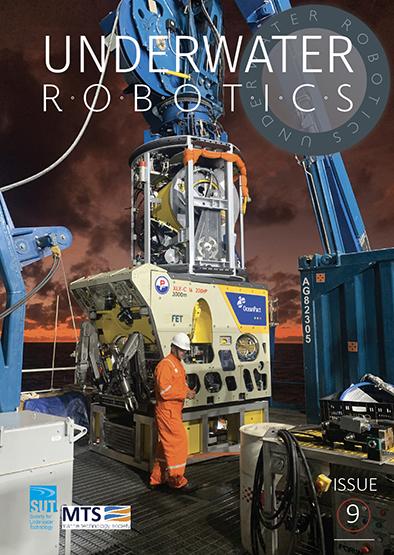
Click to read the latest issues

The Marine Technology Society Journal is the flagship publication of the Marine Technology Society. It publishes the highest caliber, peerreviewed papers, six times a year, on subjects of interest to the society: marine technology, ocean science, marine policy, and education. The Marine Technology Society has published the MTS Journal under its current title since 1969.
Click to read the latest issue.
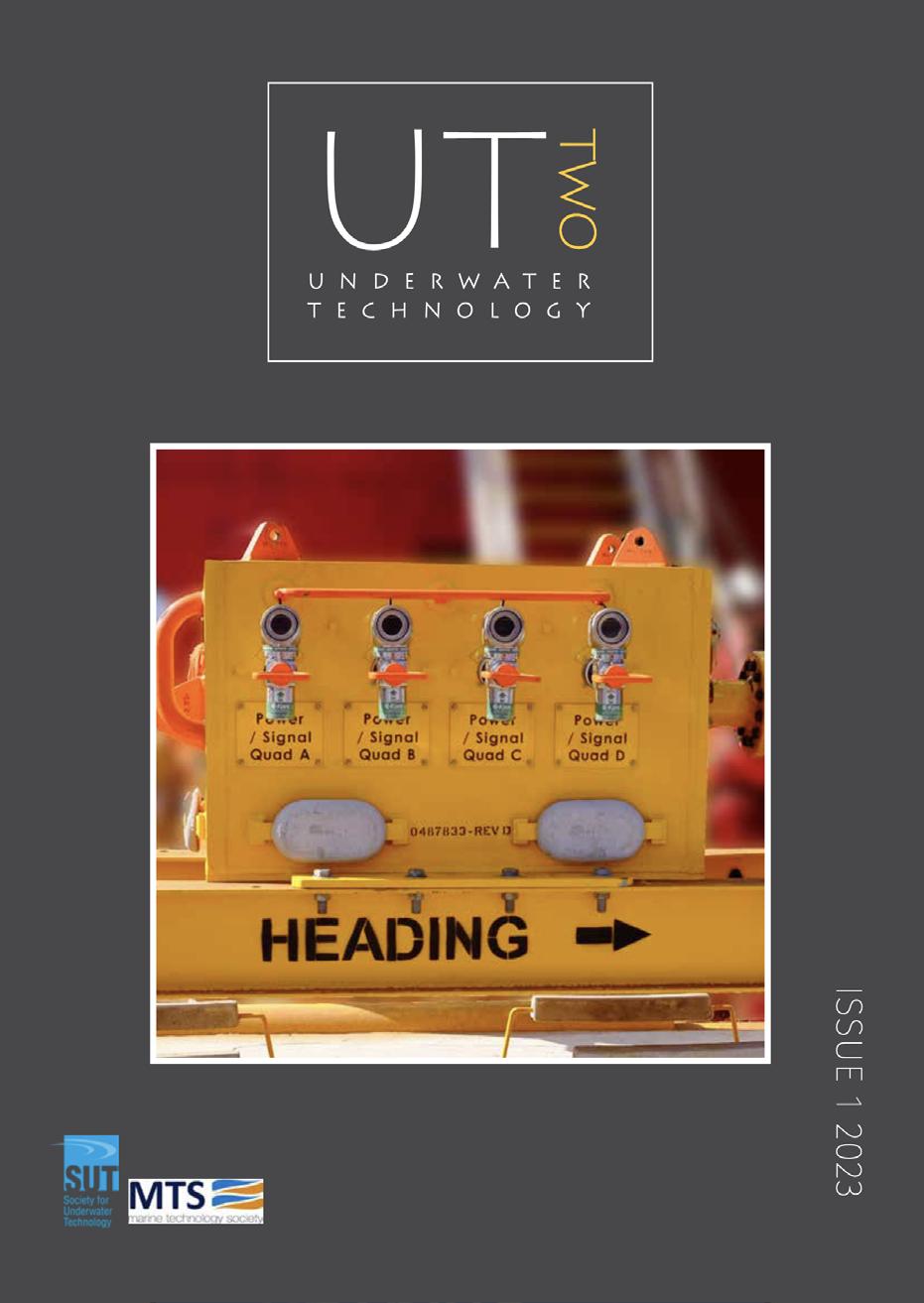
MCEDD Deepwater Development 2023
28-30 March 2023
MCEDD Deepwater Development 2023

APRIL
SUT+ Webinar – Smart Sensor Technology for Early Diagnosis of Rotating Machinery Faults

4 April 2023
Webinar
Perth – Evening Technical Meeting
5 April 2023
Parmelia Hilton Perth
SUT-US – Naphthenates: A chemist perspective of a flow assurance and production nightmare
6 April 2023
Memorial Wine Cellar, Houston, Texas, US
SUT-US - Trusted Autonomous Systems
13 April 2023
Webinar
Ocean Business

18-20 April 2023
NOC Southampton
Routes for Innovation in the Defence Market
20 April 2023
NOC Southampton
SUT-US’s Robotics and Automation Committee Presents - a Open Meeting With Speaker, Chris Yahnker
21 April 2023
Webinar
SUT-US – The Time is Now to Improve Our Understanding of the World’s Ocean
27 April 2023
Webinar
MAY
Perth – Subsea Awareness Course
1-5 May 2023
Parmelia Hilton Perth
Perth – SUT Community Casual Catchup
4 May 2023
All-Energy 2023

10-11 May 2023
SEC, Glasgow
Cyprus - Subsea Technology Eastern Mediterranean Conference
10-11 May 2023
Parklane Resort & Spa, Limassol, Cyprus
Offshore Site Investigation & Geotechnics
South West Geoforum 6
18 May 2023
Brunel’s SS Great Britain
SUT-US – Robotics Lunch and Learn with KONGSBERG Robotics
22 May 2023
Kongsberg Maritime Inc., Houston, Texas, US
SUT-US – Digital Twins for Future Energy Fields and the Blue Economy
25 May 2023
Webinar
JUNE
Perth – Subsea Production Systems Course 2023
1 June 2023
Aberdeen – Subsea Awareness Course
5-9 June 2023
Aberdeen
Perth - Subsea Awareness Course
4-8 September 2023
Parmelia Hilton Perth
SUT-US – Subsea Awareness Course

11-12 September 2023
SPE Offshore Europe

5-8 September, 2023
P&J Live, Aberdeen
Perth - June Evening Technical Meeting
14 June 2023
Parmelia Hilton Perth
JULY
OSIGp July – Offshore Geohazards and Geotechnics Course
20-21 July 2023
Perth - Materials & Corrosion Course
26-27 July 2023
Parmelia Hilton Perth
AUGUST
SUT US 2nd Annual Online Engineering Competition

1 August - 30 November 2023
Perth - August Evening Technical Meeting
16 August 2023
Parmelia Hilton Perth
9th International SUT OSIG Conference “Innovative Geotechnologies for Energy Transition”

12-14 September 2023
Imperial College London
A 25-minute topical and highly relevant presentation plus Q&A time plays an integral role in SUT MREC (Marine Renewable Energies Committee) quarterly meetings. MREC included floating offshore wind in its interests some time ago because of its link with offshore and subsea technology.

With ever-greater interest in the topic, the Committee welcomed Sam Strivens of The Carbon Trust in January 2023 to speak on floating offshore wind in general; and on the Floating Wind Joint Industry Project in particular.
Online meetings mean that a larger number of people can benefit from the presentations than at the older face-to-face form of meeting and over 40 members of two other SUT groups, the Marine Environmental Science SIG (MESSIG) and the Offshore Site Investigation and Geotechnics Group (OSIG) took advantage of what was on offer, demonstrating the interest of SUT members in floating wind.
MREC’s next meeting is on 27 April with formal proceedings finished by 15:15hrs so the presentation can begin. Our speaker will be Chris McConville, Head of Commercial and Operations at Floating Power Plant. We are keen to invite more SUT members to join us for the presentation. MREC is also eager to welcome new members to the committee who are working in the Marine Renewable Energy field. Contact emily.boddy@sut.org if you wish to join the next meeting for our presentation or are interested in becomming a member of the committee.

The SUT’s Educational Support Fund has a new grant for Doctoral students, the Bil Loth Doctoral Grant.
Named in memory of Bil Loth, past-President of the SUT, in addition to serving the Society as a member of Council and in numerous roles over three decades, Bil was a founding subsea engineer working for industry multi-nationals, as a consultant before moving to academia at the National University of Singapore, Robert Gordon University, Newcastle and Cranfield Universities.
For Bil, education, passing on his experience, information and inspiring the next generation of subsea engineers internationally was a passion. The SUT recognises that Doctoral scholars will be tomorrow’s leaders, academics, researchers, lecturers and authors and are pleased to provide a grant for these students.
Students interested in SUT’s Educational Support Fund, Undergraduates, Postgraduate Masters, and the Bil Loth Doctoral grant will find more information on sut.org/educational-support-fund/. Application forms are available on request from Jane.Hinton@sut.org. Application deadlines are strictly followed.
Click here to contribute to supporting students in the fields of subsea engineering, marine science and underwater technology via: www.justgiving.com/fundraising/bil-loth
Charity appeals it seems are like buses – nothing in sight and then along come two at once. Our immediate past President Judith Patten has set up a JustGiving page because she is going to be wing walking on 24 May (with loop the loop thrown in) to raise funds for the Bil Loth Doctoral grant. We’re tempted to give money to stop her doing anything so crazy, but she is indomitable and determined to “Do it for Bil” (she is also doing it for the Anthony Nolan Trust in memory of her son, but you can read all about it on her fund raising page.)

Awarded jointly by the Society for Underwater Technology and the Marine Technology Society, this award recognises outstanding, sustained, international contribution to the development, application, and propagation of marine technology toward the advancement of ocean exploration.
Don Walsh (born 2nd November 1931) is an American oceanographer, explorer, retired naval officer, and marine policy specialist. He and Jacques Piccard were aboard the bathyscaphe Trieste when it made a record descent into the Mariana Trench on January 23, 1960, the deepest point of the world’s oceans.

Only one completed nomination form will be accepted for each candidate. If a completed nomination form has already been accepted for your candidate, you will be notified. Only the information requested on this form will be used in the review of your candidate.
To nominate a candidate for this award, you must send a statement (up to 4000 characters) reflecting the nominee’s qualifications for this award, as well as additional documents which may include letter of support, additional information about nominee, etc.

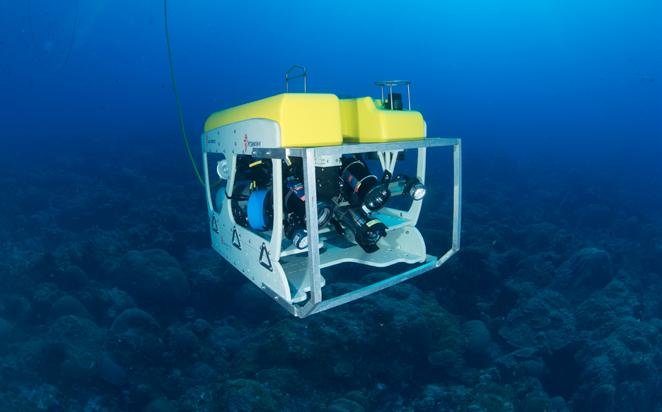
SUT’s International Panel on Underwater Robotics was honoured to announce the creation of the Gwyn Griffiths Underwater Robotics Award (GGURA) in 2020. The award recognises people in the early to mid-stages of their career (and under 40 years old) who have made outstanding contributions to their field in underwater robotics. The award may be for industry/commercial, research and/or creative activity in underwater robotics. The winner will receive £500, a certificate and an engraved award. Neil Bose, Chair of the Panel on Underwater Robotics stated:
“Members of the Panel on Underwater Robotics were excited by Professor Gwyn Griffiths’ generosity in supporting this award and were especially enthusiastic that it should be an early to mid-career award to encourage the up-and-coming generation of underwater robotics workers in their careers.”
Gwyn Griffiths MBE, a Past President of the SUT added:
“
As a vibrant, forward-looking learned Society the SUT is at the forefront of encouraging and facilitating international cooperation in Underwater Robotics. From my own career I know that peer-recognition of achievements through an international Award can make a substantial and lasting difference. These have been times for reflection, and by enabling this new Underwater Robotics Award I am delighted to support the innovators of today and tomorrow.”
Nominations or applications for a GGURA must consist of the following documents:
• A letter of nomination or application that describes how the candidate meets the criteria.
• The letter should be no more than two pages in length. Supporter(s) of the nomination/ application may add their signature to this letter or supply an email that indicates their support for the candidate
• A 100-word citation or appraisal of the candidate’s research describing their contributions in a way easily understandable to those outside the discipline
• A curriculum vitae
Nominations for the 2023 award are now open and will close on 1st May 2023 www.sut.org/gwyn-griffiths-underwater-robotics-award-ggura/
So far there have been two winners of the GGURA - both can be heard on ‘The Underwater Technology Podcast’.

2021 - The winner of the inaugural GGURA was Aleksandra Tomaszek MBA, 1 CSI Ltd Co-founder & COO, Strategic Subsea Business Partner.
2022 - Winner Rustom Jehangir, Founder and CEO at Blue Robotics.
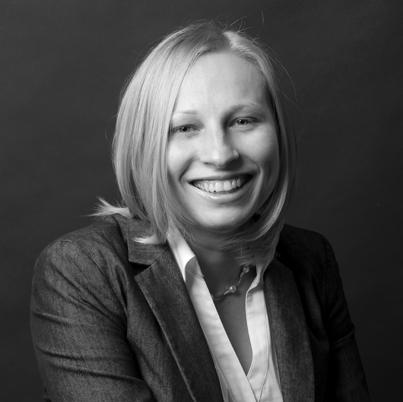

Greensea Systems, Inc. (Greensea) is an award-winning, leading subsea robotics specialist, founded by CEO and President, Ben Kinnaman, in 2006. Greensea is headquartered in Richmond, Vermont, USA, with additional offices in San Diego, California, and Plymouth, Massachusetts.


Greensea’s mission statement outlines its aim of improving the relationship operators have with robotics, by making the work they do together more productive and satisfying. To achieve this, Ben and his team developed a commercially available open architecture software platform, OPENSEA. OPENSEA provides reliable and accurate autonomy, navigation, and control to over 3,000 ROVs, USVs, and AUVs for commercial and military applications around the world.
OPENSEA

OPENSEA offers a flexible and scalable core of software capabilities, for marine robots. The core capabilities include inertial navigation, vehicle control, automated tasks, payload integration, sonar processing, vehicle perception and autonomy. Being open architecture, the platform enables integration of third-party robotic hardware, such as sonars, cameras, manipulators and inertial navigation systems, thereby helping to deliver precision and accuracy to ROVs, AUVs, USVs, and other autonomous and remotecontrolled marine vehicles, whilst being operator friendly, reliable, and easy to maintain.
Greensea places huge importance on its open architecture inviting and fostering innovation. Collaborators can easily interface with OPENSEA, which allows the expansion of their systems’ capabilities quickly and efficiently. Developers and manufacturers can use OPENSEA to jump-start their technologies, using OPENSEA’s core capabilities, while developing their own intellectual property. The distributed framework of OPENSEA allows containment of IP that can clearly isolate and protect their developments.

Armach Robotics, Inc. offers an autonomous in-water robotic hull cleaning and surveying subscription service. Utilising OPENSEA to provide precise on-hull navigation, autonomy, and longrange command and control, it offers ship owners a solution for always clean hulls which improves fuel efficiency, reduces carbon emissions, and aids in the reduction of invasive species. transfer.
Bayonet Ocean Vehicles, Inc. (image left) utilises OPENSEA for its range of underwater ground vehicles, for precise navigation, payload integration, autonomy, and over-the-horizon command and control, for commercial and military applications.


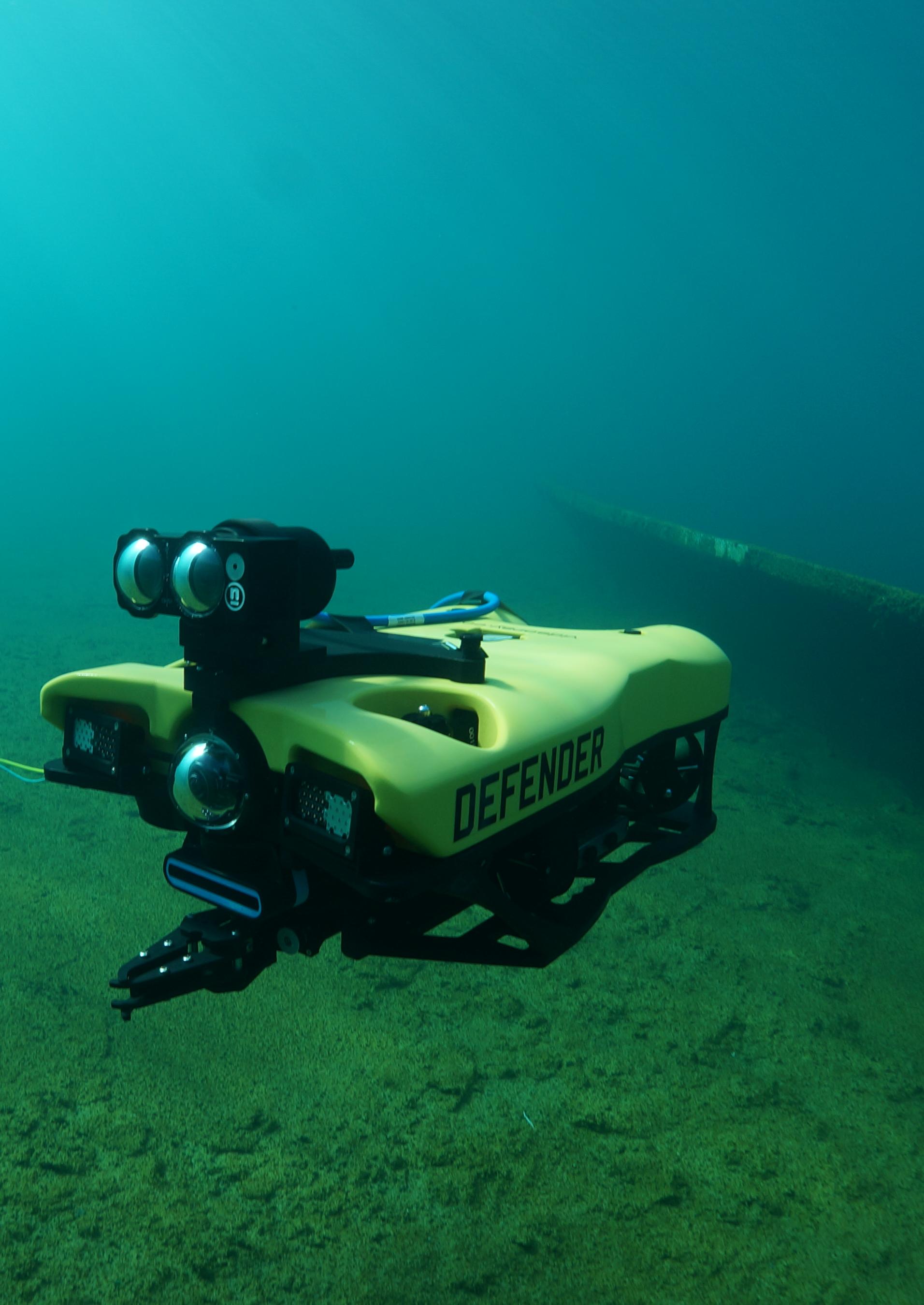
VideoRay (background image) collaborated for their ongoing development of their mission specialist series ROVs, enabling more precise control of the vehicle position, orientation and direction, making it ideal for heavy-duty or dangerous missions. Blue Ring Imaging and SeeByte are collaborating with Greensea, developing their products to integrate into vehicles built on the OPENSEA platform. This brings virtual reality (Blue Ring) and artificial intelligence and machine learning (SeeByte) to a wide range of vehicles.
Earlier this year Greensea launched its latest platform, OPENSEA Edge, the next level of bringing true autonomy to underwater technology.
The Greensea team is delighted to have joined the Society for Underwater Technology, and looks forward to meeting fellow members at one of the upcoming SUT events. Greensea will be at Ocean Business 18-20th April in Southampton, UK and Offshore Technology Conference 1-4th May in Houston, TX.
Blue Ring Imaging and SeeByte
“Well you know what they say about all work and no play… thanks to the SUT Middle East Committee for a stimulating discussion on the market, subsea technology, EPRS and decom events. We’re looking forward to the upcoming events on umbilicals, decarbonisation, sustainability, renewable and shallow-water completion/tie-backs, AC vs DC for offshore power. Thank you to Ashtead Technology for the venue and thanks to all the Middle East Committee for all the hard work and dedication.” - SUT Middle East Chair, Adrian Phillips


SUT Members - if you or your company has news or an update they’d like to share in Big Blue World please contact emily.boddy@sut.orgSUT Middle East Branch committee meeting at Jebel Ali, Dubai, March 2023
Crondall Energy is recruiting for several technical positions as a result of significant growth in all areas of the business.
This year has seen the company deliver record results in energy transition projects as well as the traditional oil and gas business. Some highlights from the 2022 workload include ongoing support to BEIS on CCUS, along with WSP and Geo-Energy Durham, platform electrification with Orcadian Energy, ongoing development of Crondall Energy’s proprietary floating substation technology and development of grid-scale energy storage concepts to name a few.

Stephen Booth, Crondall Energy Director, said “We have had a very busy year working on some very diverse projects, the time has come now to grow our team quite substantially. We have a really great team with a great retention record and are looking for key individuals to become part of the Crondall family.”
Crondall Energy is looking for engineers with 5+ years’ experience in process, marine and subsea disciplines to work on energy transition, oil & gas and renewable energy projects. To learn more, visit the website – www.crondall-energy.com/careers.
For more information contact amy.grant-simpson@crondall-energy.com or visit www.crondall-energy.com

All-Energy 2023, the UK’s largest renewable and low carbon exhibition and conference (SEC Glasgow, 10 and 11 May) looks forward to welcoming you.
SUT (stand Q03) is All-Energy’s Learned Society Patron, which ensures that when it comes to conference coverage of tidal, wave and floating offshore wind (FOW) there is plenty to attract you to the event. A three-session stream has been devised by SUT’s Marine Renewable Energies Committee’s (MREC) members from the ORE Catapult and is both highly relevant and topical.
Tidal stream features two panel discussions – ‘The transition to volume manufacture’ and ‘The route to 1GW deployed (UK and international) achieving the goal’. Next comes ‘Marine and FOW: Consenting – streamlining the process’ and then ‘How do we get policy makers to support wave energy’.
Add to that five sessions on offshore wind; a Marine Scotland session, and a show floor theatre for offshore wind (Day 1) and marine renewables (Day 2) and much more in over 50 conference session and eight show floor theatres ... and all free to attend.
The major exhibition will feature over 250 exhibiting organisations and there is the ever-popular Giant Networking Evening, incorporating the Civic Reception 18:00-20:30 on 10 May at the Glasgow Science Centre to look forward to. Registration is at www.all-energy.co.uk/SUT
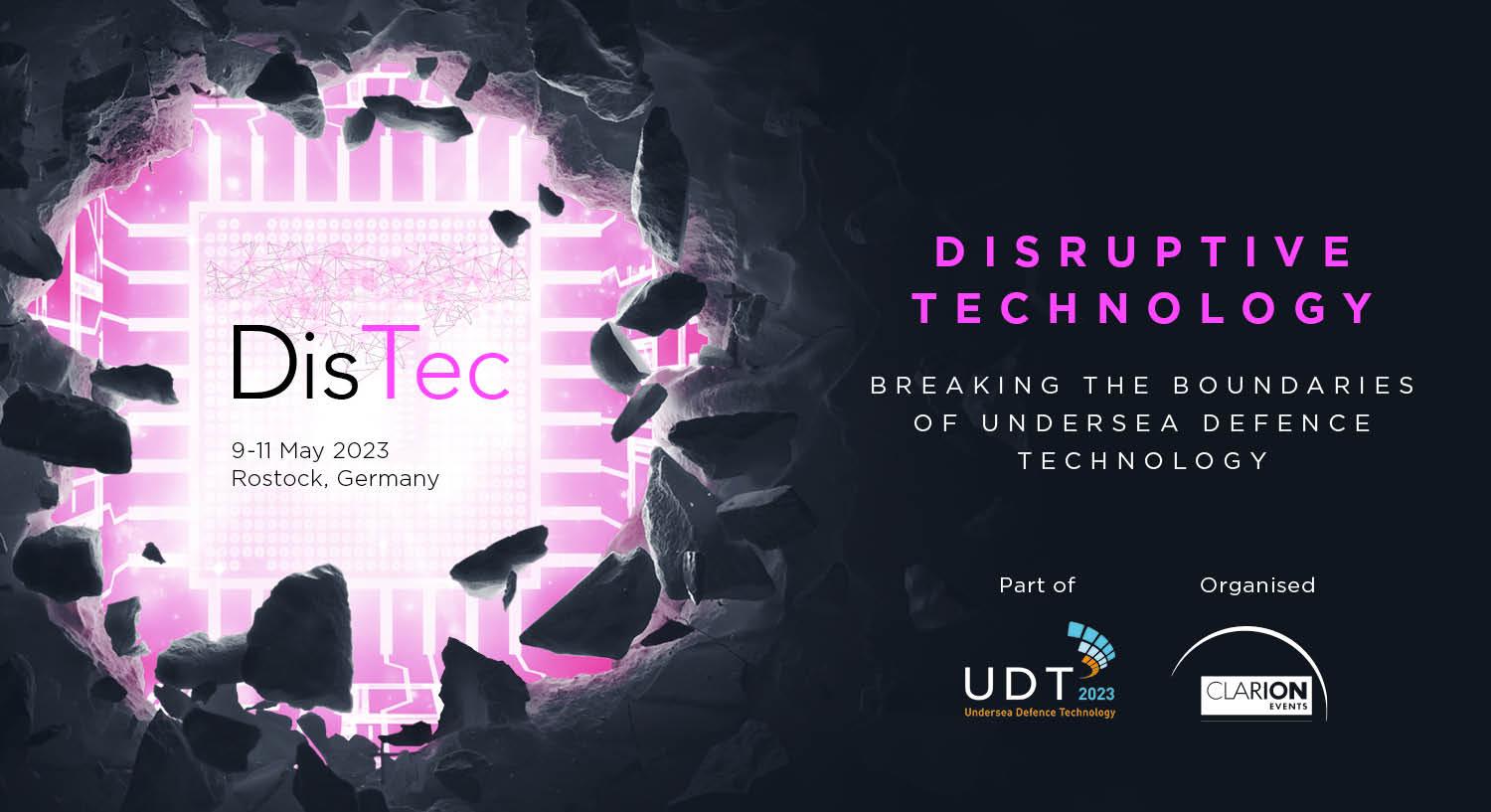


Marine Geophysical Surveys for Offshore Wind sites have been, up to now, restricted to hull mounted equipment. The slower speed and quieter vessel, coupled with the latest sonar technology, has made it possible to replace side scan sonar with Uncrewed Surface Vessel (USV) mounted high-resolution multibeam echosounders for the detection of small objects. However, the deeper waters in which offshore wind farms are being located and the requirement to detect the same size objects, necessitate the use of a side scan sonar, as the resolution of the multibeam sonar on the surface makes it more challenging to resolve small objects. The other instrument that is routinely used for marine geophysical surveys is a magnetometer. It is used to detect ferrous objects including pipelines, cables, wrecks and UXOs. Magnetometers have to be used close to the seabed and outside the magnetic influence of metal structures (e.g.: vessels). Magnetometers therefore have to be towed and quite often are “piggy-backed” behind the side scan sonar.
XOCEAN operate the largest commercial survey USV fleet with 25 of the XO-450 class USVs currently at sea. The XO-450 USVs have acquired over 75,000 hours of operation around the world in the last four years. Building on that experience has been crucial in taking the next step to implement a solution to tow a side scan and magnetometer behind the USV. Towing with a USV has to be automated and has to be integrated to the command & control of the USV, for both safety and operational reasons. XOCEAN design & build the command & control interface to the USVs, called Cyberdeck. Information, such as the depth of the side scan sonar and its height above the seabed is fed directly in Cyberdeck. This is important for both the side scan and the magnetometer data quality. A specific real-time page in Cyberdeck shows the USV Pilots, surveyors and geophysicists the location of the towed equipment and the operating parameters.
The XOCEAN solution has been proven to produce excellent quality data and magnetometer surrogate trials have been successfully conducted to ensure that targets of a certain size can be detected for ALARP certification requirements.


It has been calculated that a 24-qubit quantum computer operates 4 x 102.5 Million times faster than the conventional 24-bit computer. In other words, it will complete tasks so fast that it will do multiple jobs at the same time and produce results faster than your laptop screen can blink!
This in practice will be seen in the late 2030s when they have reduced the quantum computer chip down to fit into laptops and smart phones. This phenomenal speed increase will allow a quantum leap in robotics performance as the computer runs its twin simulator constantly checking its own performance and results. Add to this the extraordinary ability of battery power by the late 2030s and here is how this new fast world of computing will affect the offshore industry, and in particular, naval warfare.
Advanced autonomous underwater vehicles (AUVs) are presently used for scanning the seabed and returning to the surface for data download and recharge prior to diving again (see picture). However, the increase in battery power and the onboard quantum computer speed will allow the AUV to become a self-thinking, self-propelled drone. The AUV drone will travel in swarms with a sergeant AUV at its centre. The sergeant will transmit commands to each private drone by high frequency clicks in similar manner to dolphins. Because their clicks can be heard some distance away, they are encoded to ensure an enemy AUV cannot translate them. The sergeant will sit at the centre of the swarm and issue instructions on the mission and where each private drone should go. The sergeant has the ability to reprogram any private drone, should a private be incapacitated for any reason (such as being picked up by fishing nets or opposition drones).
There are no surface vehicles that can withstand a drone swarm torpedo attack, and there is no method of camouflage for the hull of surface vessels, unless the vessel can minimise its under-water signature. This can be done by the use of very light hover-craft vehicles with the proviso that the hovercraft can turn on its side and travel at very high speeds (40+ knots) across the water’s surface, like a catamaran, in order to get away from the AUV attack. Alternatively, the hovercraft could elevate up into the air, thereby losing its underwater signature while acting as an airborne drone.
The use of such AUV drone swarms replaces the use of submarines, because they are cheaper, smarter and faster, travelling through the water with propulsion from propellers using very
efficient fan blades. When battery power is running low, the swarm constantly monitors seawater current so that when it does detect a large current, the sergeant determines whether the swarm should recharge their batteries in similar manner to windmill turbine blades (blades turning in the current, producing stored power). It would not appear unusual to someone resident on the seabed, to see a swarm of maybe 100 drones sitting in a group at 50 metres water depth either in mid-water column or on the seabed, with their propellors going round but the drones not moving. They have been programmed to recognise coral and rough seabed conditions so always take up a location where the seabed is flat and stable for an hour or more recharge of their batteries.
When batteries are low, they can also surface allowing their whole-body surface to receive solar energy from the sun and convert it to battery power. They could remain near the surface if needed to recharge without breaking the surface, but their recharging is much slower due to less solar ray energy arriving on their body - dispersing in the water above them. Occasionally the sergeant AUV breaks surface to receive mission instructions from the CubeSat satellites.
Most AUV drones are battery powered, but later in the century it becomes possible to install small nuclear engines within their body to keep them operational for decades. However, the issue of a mishap occurring with a nuclear engine subsea limits this possibility to safe operations, but during naval warfare, their rechargeable batteries are safer and cheaper to manufacture. Oh and needless to say, each drone is kamikaze and expendable.
Pictured: AUVs/ROVs are presently being developed which settle on the seabed to record seismic data, and then automatically move to their next location.

(Picture courtesy Blue Ocean Seismic Services)

As the oil and gas industry pushes further offshore and marine renewables increase in importance to meet future energy needs, the boundaries of traditional engineering practice continue to be pushed. This in turn increases the importance of research and industry working together, according to Paul Gardner, Shell’s Geomatics Manager (Development & Subsurface - West).
Shell sponsors the Chair in Offshore Engineering at UWA and was one of the founding partners in the OFFshore ITRH (Industrial Transformation Research Hub) with the Australian Research Council, Woodside, Lloyd’s Register and Bureau Veritas – a five-year collaboration which concluded in December 2021.

“The OFFshore ITRH was an important programme to strengthen WA’s position as a location for offshore engineering capability, not only for our local industry, but also internationally,” said Gardner.
“A key enabler for the OFFshore hub was how the research programme was structured, from which we were able to get direct benefit to our operations within the timeframe of the project,” said Gardner. “It created an environment where industry could work with academics and researchers and bring problems to the research capability being developed. This type of collaboration helps to advance the research into the deployment stage – out into the real world – more rapidly.
“One example, relating to the data science workstream, explored predictive methods applied to infield buoy data for ocean currents. The research resulted in a step change in how we were predicting sea surface currents at our Prelude Floating Liquefied Natural Gas (FLNG) facility. This work has also been utilised by other partners in the OFFshore hub.”
Perhaps the most significant benefit has been the collaborative nature of the partnership, according to Gardner. “Having an ecosystem where industry and academia can work together on domain-relevant issues is very valuable and will continue to be so.”
The success of this collaborative ecosystem has attracted over 20 partners – including Shell – to TIDE, the new ARC research hub at UWA. The TIDE partnership adds innovation in the data science space, building on the work of the OFFshore hub’s engineering focus.

Lina Velosa, Director of Innovation (APAC) at Fugro, sees a lot of opportunities in TIDE, particularly after the success of the OFFshore hub.
“The TIDE partnership isn’t only about the university and Fugro – it’s the whole collaborative environment that
also includes the end client, which is very valuable to us,” said Velosa. “We have direct access to data and to people who are making decisions and asking questions to direct the research. We don’t need to bring our work to the industry – the industry is already invested, and we can build the solutions together.”
As data science specialists, the future possibilities of TIDE’s digital engineering research are naturally of interest to Fugro. “We want to enable people to make better decisions – not only now, but also in the future,” said Velosa. “That means developing better models to get better predictions on which to base those decisions. But to develop the models, you need the right information – the right data – and that’s where TIDE is so valuable. For us, a lot of the benefit is getting existing and new data sets that are going to make our decision trees more substantial.”
Innovations in offshore infrastructure have potential far beyond the oil and gas industry. “Our mission as a company is to create a safe and liveable world – we can’t achieve that on our own,” said Velosa. “It’s something we have to do together with the industry, researchers, contractors, local operators and certifying bodies. TIDE brings everyone together so we can move into that productive, innovative space. It’s exciting making that happen and growing those relationships. We’re advancing the research and the technology further than it’s ever gone before. Ultimately, it’s for the benefit of the world; it will certainly have applications beyond what’s relevant to TIDE. For example, we have a big team working with living infrastructure, and we’re looking at how we manage that in the sub-sea environment and how things are likely to change with time and with climate change.”


Shell’s involvement in TIDE is also looking to a future beyond the oil and gas industry as it operates today.
“We hope the TIDE programme will develop to be internationally recognised in the digital engineering and data spaces. We’re working towards greater safety and efficiency in offshore oil and gas sites and transferable applications in the growing renewables industry, which is helping the world transition towards a lower carbon future. For us, it’s ultimately about the transfer of capability and experience from offshore oil and gas into renewables and energy solutions,” said Gardner.
“Collaboration is the key. Research partnerships like the OFFshore hub and TIDE enable us to create a platform for collaboration. In many ways the TIDE hub is a recognition of the success of the OFFshore hub – but the fact that it has attracted so many partners is testament to the relevance of the themes of the TIDE hub. We are in a position now to collaborate with two Australian universities, four international universities, three international research partners, local operators, contractors, and certifying bodies, all coming together around the research themes of TIDE, here in WA. It is really powerful.”
Since the first publication of these Guidance Notes, in 2014, there has been a significant increase in the scale and number of offshore renewable energy projects.

This competition aims to showcase interesting technical innovations in the fields of offshore Geoscience and Geotechnical Engineering linked to the SUT OSIG 2023 conference themes that have been developed by students globally during their study.


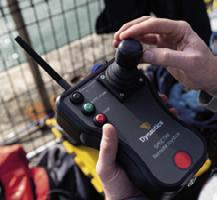





Join the industry’s biggest networking event as we all work towards a prosperous and sustainable net zero and energy security.
TAKE THE OPPORTUNITY TO:
SOURCE CUTTING-EDGE TECHNOLOGIES AND SERVICES showcased throughout our unique feature areas, all in one place, at one time under one roof.
NETWORK WITH THE INDUSTRY and connect with providers throughout the supply chain in a productive and positive atmosphere.


LEARN ABOUT ALL FORMS OF RENEWABLE ENERGY from expert speakers at the award-winning conference.


The SUT’s Offshore Site Investigation and Geotechnics (OSIG) committee is pleased to announce that its 9th international conference, ‘Innovative Geotechnologies for Energy Transition’, will take place from 1214 September 2023 at Imperial College in London, with the ISSMGE 6th McClelland Lecture, and the Conference Dinner at the Natural History Museum.



Early-bird rates, SUT Member rates, and student rates available.
Go to www.osig2023.com to register now!
12-14 September 2023 | Imperial College, London
Sponsorship opportunities are detailed on the OSIG2023 website and in the brochure (click below to read). There are many opportunities to support the conference, and we are also happy to discuss other suggestions.
Should you wish to support this ‘best in class’ international conference and discuss sponsorship opportunities, please contact osig2023@sut.org or go to www.osig2023.com
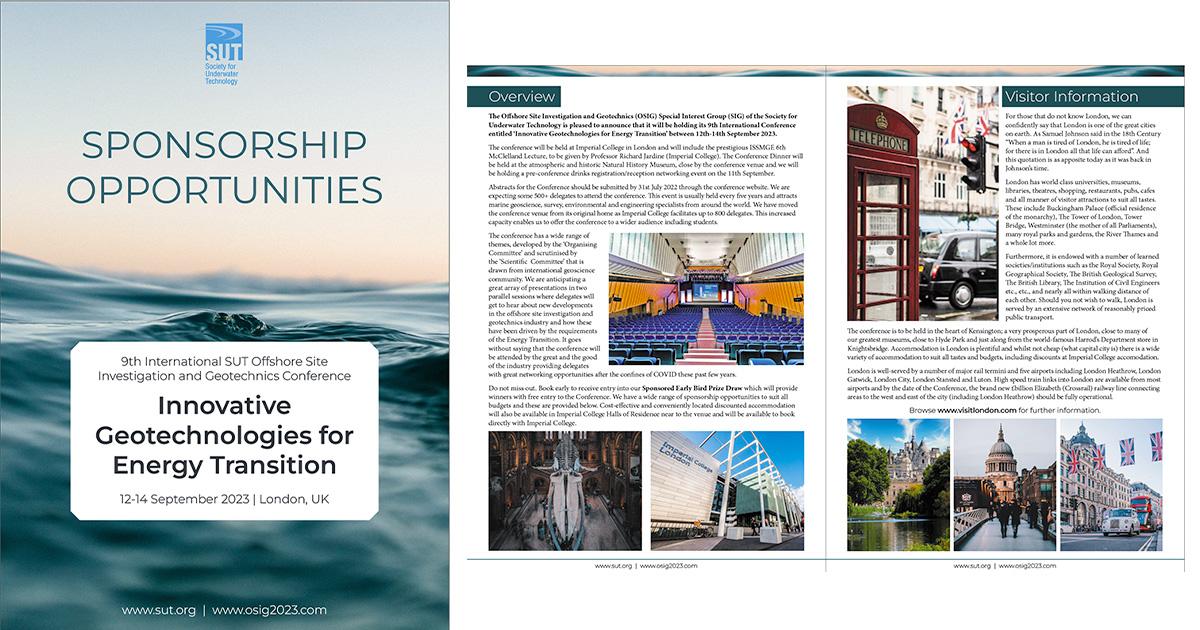


A big big thank you to Helen Stewart for an amazing evening!

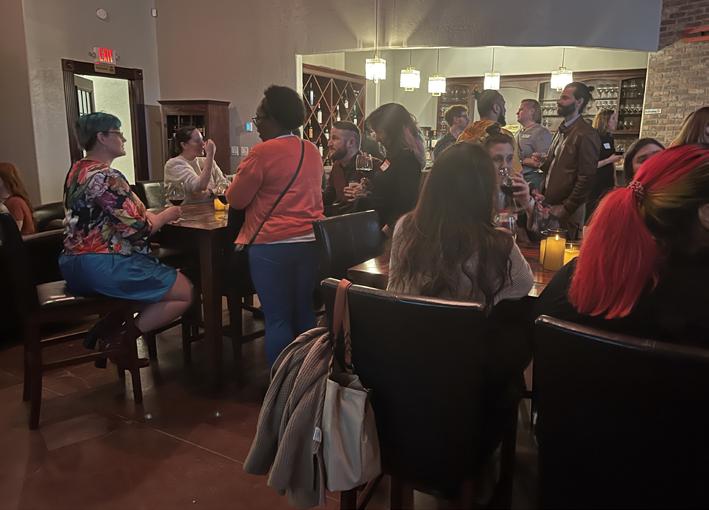

One of our series of Champagne & Conversation! Our special guest, Helen Stewart, CH, Hygropher at Fugro, discussed with us a few of the health and safety challenges women face in the offshore industry as a part of her findings from the International Hydrographic Organization (IHO) Empowering Women in Hydrography (EWiH) Project.

The International Hydrographic Organization’s Empowering Women in Hydrography Project commenced in 2020 with the stated aim of improving the ability of hydrographic and offshore scientific industries to better achieve their goals by recruiting and retaining talented women in their workforces. We cannot meet this goal with a simplistic “add women and stir” mindset: increasing the likelihood that skilled, trained women will join the offshore workforce and stay with it requires all stakeholders to make systemic and structural changes to the existing conditions.
A significant target of the Empowering Women in Hydrography Project is improving existing health and safety practices to better protect the health, safety, and dignity of women in the industry. We started by introducing The Big Three health and safety challenges for women in the offshore workforce, explaining how these challenges developed, and what we as professionals and as members of the offshore industry can do to mitigate these problems. Then, we presented the 60Day Challenge—what can YOUR organization do to improve the health, safety, and dignity of your women working offshore in 60 days? A lot was discussed that afternoon.
The five-day Aberdeen Subsea Awareness Course provides underpinning knowledge for new entrants in the subsea sector of the offshore energy industry, as well as offering a refresher for experienced professionals seeking to update their knowledge.
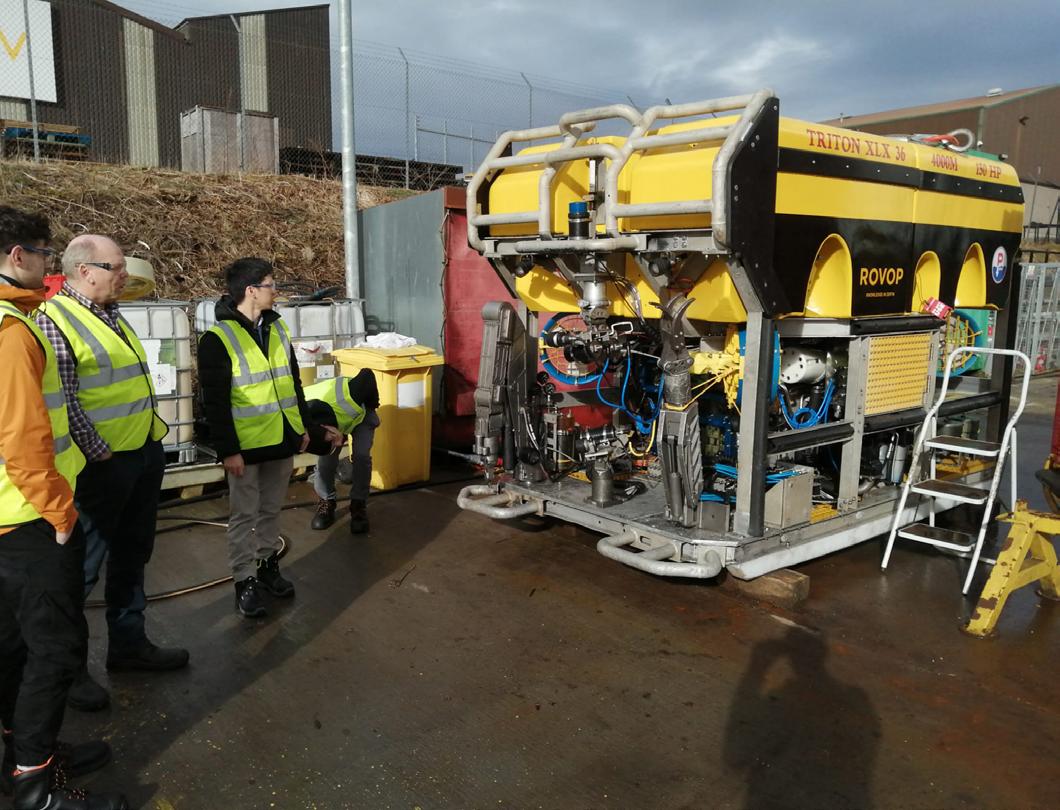


Our week covered an introduction to the subsea sector, oil-field equipment & flow assurance, offshore renewable technologies & susbea control systems, pipeline & riser systems, subsea operation, decommissioning, and the future. Our delegates enjoyed a hands-on insight into the world of subsea with site visits and presenters from a wide range of organisations.
Thank you to everyone involved, and many thanks to all the delegates for attending, we hope you had a great week! The Aberdeen Subsea Awareness Course will be back on 5-9 June this year! Register your place at www.sut.org/events.


Under the title of ‘Opportunities in an Imperfect Storm’ the Aberdeen SUT Business Breakfast returned after a two-year break on Tuesday 7th February at the Marcliffe Hotel in Aberdeen. James Hall of Axiom EMI with Catherine MacFarlane and Ross Macdonald, both of S&P Global, gave a market outlook for the offshore and subsea energy sectors.
A screen of conflicting news-media headlines looped whilst everybody arrived at 7am and networked over breakfast, covering the energy transition, fossil-fuels, domestic UK politics, Ukraine, vessel rates and renewables, all to set the scene. The event title and headlines were deliberately chosen to be somewhat provocative as Chair Martin Harley’s introduction covered to the political, taxation and civil society pressures on the energy industries, capacity and technical limitations of fossil fuel and renewables and the implications of recent attacks on subsea pipelines and cables.
James Hall of Axiom EMI presented market research on global oil and gas demand, oil price, impending project sanctions, offshore rig activity and subsea tree orders, before reviewing offshore wind installation and cable targets, with a brief excursion into critical minerals and subsea mining. His overall message was of a supply chain crunch that would hamper the building of new developments and an energy shortage persisting until at least 2026 as renewables would be unable to make up for oil and gas shortages.
Ross Macdonald and Catherine MacFarlane of S&P Global reinforced these conclusions with their analysis of the global fleet of subsea and offshore construction and service vessels. Their broad theses was that due to significant scrapping of older vessels following the 2014 downturn, the global fleet was young, but not big enough for the current demand from both subsea and wind sectors which currently compete for much of the same tonnage. For all classes of vessels, rates have sharply risen as a result and the sector looked buoyant as far out as 2032.
Whatever the coverage in the news media, there were some reasons for optimism in the offshore energy sectors. Our audience had plenty of questions and all three speakers were kept busy even after the meeting was formally closed. The SUT Business Breakfast will return next year.
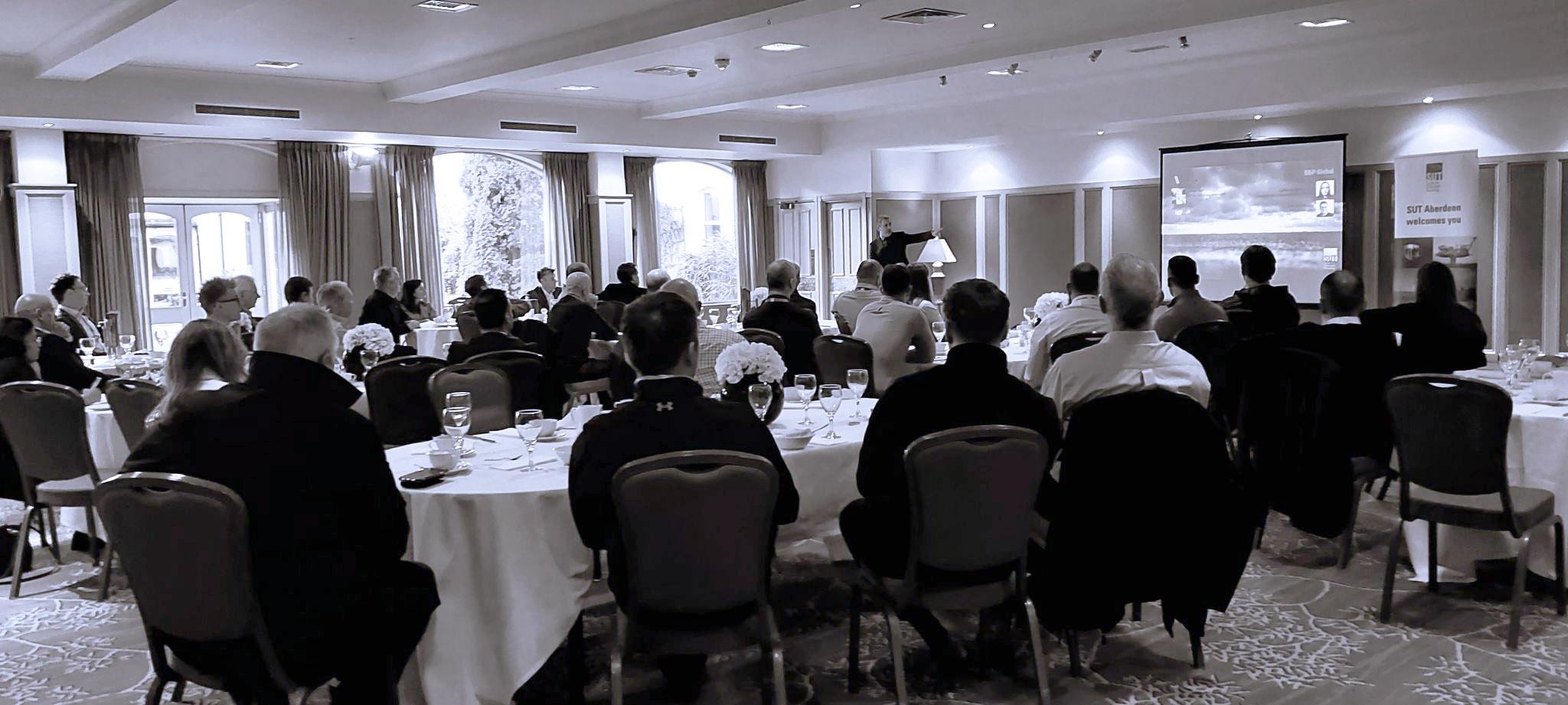


Mubarak Marine kindly hosted Middle East SUT first event of 2023 on the Decommissioning on 24th January 2023. Not an area which has attracted huge attention in the Middle East compared to some of the more mature basins in the UK and GOM. Interestingly enough it was the COVID-19 pandemic that got Aramco started decommissioning some of its assets on the Safiniyah field, more than anything to keep vessels in use. Claxton, Ashtead Technologies and James Fisher covered topics from well plug and abandonment, topsides and deck removal as well as subsea infrastructure including pipelines, cables and flexibles. Equipment on display include diamond wires, shears, water cutting and case studies included North Sea, KSA and Thailand. Presentations were followed up with a highly interactive and lengthy Q&A. Apart from the technical challenges in the comparatively shallow waters of the Middle East, a lack of regulation or policy on the subject as well as almost zero visibility on the spend creates significant challenges for would be investors. That said, the three companies are all set-up in the Middle East (UAE), and engaged on a number of projects out of the region.
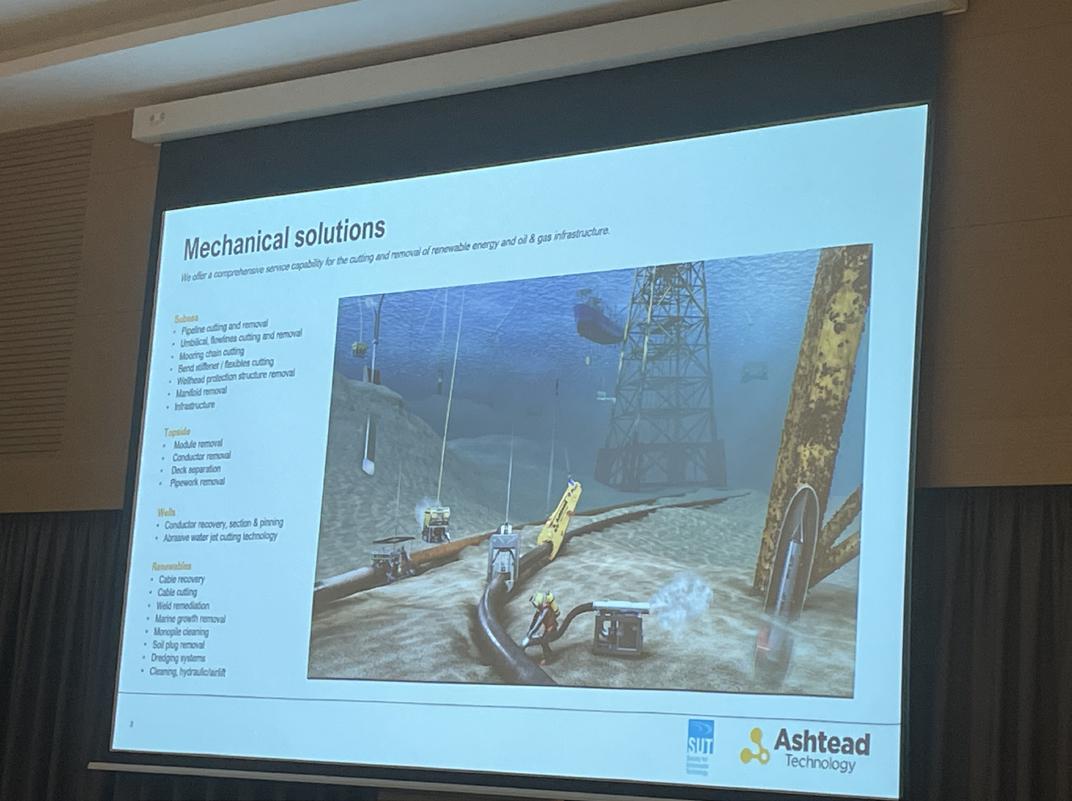

A crucial event for any company operating in the underwater sectors, Subsea Expo highlights the capability and ingenuity across industry. Hear from world-leading experts on a range of subjects at the free-to-attend conference, and celebrate the achievements of the best and brightest people and companies at the Subsea Expo Awards.
We were delighted to attend this important event, catching up with colleagues, international and local SUT members, old and new, and seeing what our Corporate members are up to!



After a long hiatus, AOG Energy, Australia’s premier oil, gas, and energy trade event, finally made its muchawaited comeback on March 15-17, 2023, at the Perth Convention and Exhibition Centre. The event was a resounding success, welcoming back both local and international delegates for three days of collaboration, insights, and networking.
The conference program was jam-packed with a wide range of topics, centred around the opportunities and challenges posed by the energy transition. These included Offshore Wind, Decarbonisation, Decommissioning, Hydrogen, Subsea, Low Emission Technology, and more. The show floor was also bustling, with over 260 exhibiting organisations showcasing their latest innovations and technologies.
Furthermore, there were four conference forums running concurrently. One of them was the dedicated Subsea Forum, which SUT-Perth was proud to be one of the hosting partners. A major drawcard for the subsea community, this forum brought together some of the brightest minds in the subsea industry to discuss the latest technologies, innovations, and challenges facing our sector.
The value of this event was evident from the impressive statistics shared by AOG Energy.
• Over 6,500 visitors attended the three-day trade exhibition, representing 40 countries.
• The conference sessions alone attracted 3,264 attendees, including 184 speakers, which included State and Federal Ministers.

In addition to the conference and exhibition, AOG Energy also hosted several networking functions, including the Subsea Welcome Drinks, Opening Party, and the Diversity and Inclusion Breakfast. These events were attended by over 1,370 guests, providing ample opportunities for attendees to connect, collaborate, and forge new partnerships.
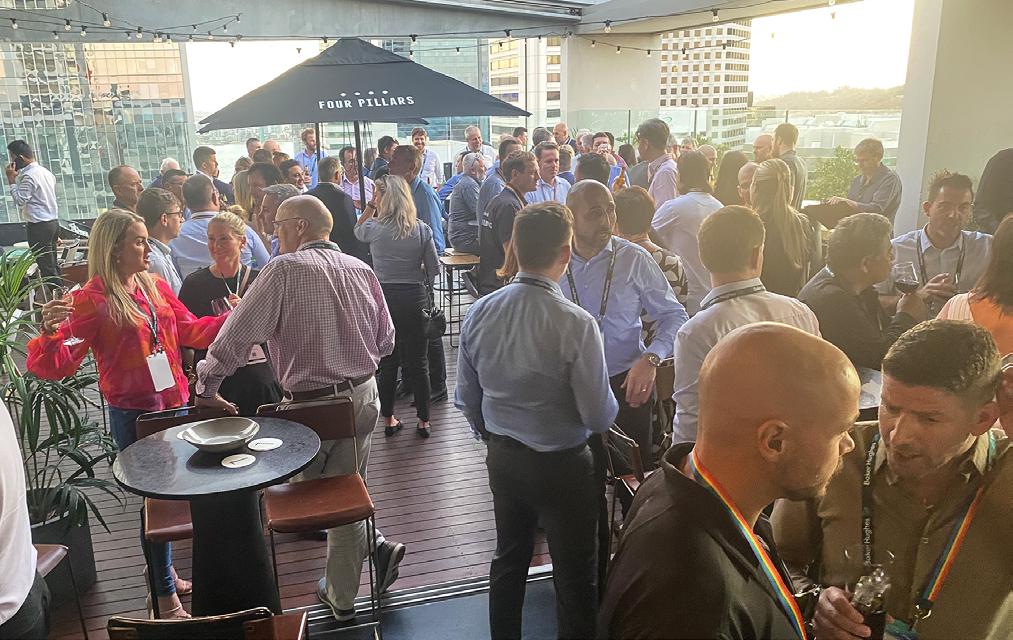
Overall, AOG Energy’s return to Perth was a significant success, providing a much-needed platform for industry professionals to discuss the latest trends, innovations, and challenges facing the energy sector. The event’s focus on the energy transition and the subsea industry, in particular, made it an invaluable experience for all attendees, and we eagerly await its return in 2024. Save the date on your calendar: 13-15 March 2024.

On 18-19 January 2023, The University of Southampton hosted a two-day introductory course on geophysics and geotechnics for the Society for Underwater Technology (SUT). The course featured lectures each morning followed by hands-on sessions each afternoon coordinated by SMMI’s Justin Dix (Ocean and Earth Science) and Dave White (Engineering), with invaluable help from colleagues from the National Oceanography Centre and the Norwegian Geotechnical Institute. The course was attended by 40 industry delegates from consultants, contractors and operators, mainly from the offshore renewables sector.

Day 1 of the program was held at the National Oceanography Centre, Southampton with the focus on geophysical methods. The morning lectures by industry experts were followed by an afternoon spent in the computer lab using bathymetric, high resolution seismic and digital geotechnical data to tackle and range of seabed engineering problems. The day closed with a networking session and a fine dinner served in the refurbished NOCS café.
Day 2 took place on the Boldrewood Innovation Campus, with lectures on geotechnics in the morning followed by an afternoon of activities spread around the National Infrastructure Laboratory. These included core logging, soil testing, seabed mapping, centrifuge modelling, a CPT truck visit and virtual and augmented reality viewing of maritime archaeology.
The course convenor, Francesca Ciavaglia of Lloyd’s Register said “A very successful event thanks to the expertise and dedication of all the presenters and demonstrators, the superb organisation by Prof. David White and Justin Dix and their team. I was particularly impressed by the ocean related technologies and research facilities of the University of Southampton, a fundamental add-on for this course”
The SMMI staff involved in the course were Justin Dix, Dave White, Susan Gourvenec, Jared Charles, Madhu Murthy, Felix Pedrotti, Stephanie Blankshein, Miquel Massot Campos, Faten Ibrahim, Katherine Kwa, Hitesh Halai and Hugo Putuhena, along with Mike Clare of the NOC, Santiago Quinteros and Vishal Dantal of NGI and Andrea Diambra from the University of Bristol. Fugro kindly supplied a cone penetration testing truck from their Wallingford headquarters, providing tours of this equipment.
The course was heavily over-subscribed, highlighting the demand for skilled expertise to support the growth of offshore developments, particular for offshore wind energy. We are working with the SUT to offer the course again in the near future.

The 18th January 2023 saw a return to an in-person AGM for the SUT Aberdeen Branch, as an informal networking event in place of the traditional black tie dinner. Peter Blake, interim chair of the branch chaired the event, providing an update on recent activities of the branch along with plans for a reformed branch committee maximising opportunities for SUT engagement going forward.
Departures from the committee were announced, which this year included Jamie Wilson from the Treasurer role and Phil Bremner. Also departing the committee after 38 years of being involved in the Aberdeen Branch, a tremendous commitment, we thank Jim Mann for his extensive service to the SUT.
Newly elected to the Aberdeen Branch committee were Sylvain Denniel, Euan Fowler, Calum Hayton and Shruthi Sivadasan.
Martin Harley announced his departure from the branch chair role during the year after four years service, a time of significant turmoil due to COVID restrictions during which Martin has provided excellent leadership for which we are extremely grateful. Peter Blake had stood in as interim chair until a new chair could be appointed. Patrick Duggan departs from vice-chair role. Both remain on the branch committee.
A change in leadership was taken as an opportunity to evaluate key functions of the committee, with the following owners of sub-groups appointed: Keith Anderson – Events, Graham Whitehead – Training, Euan Fowler – Projects and Shruthi Sivadasan – Liaison.

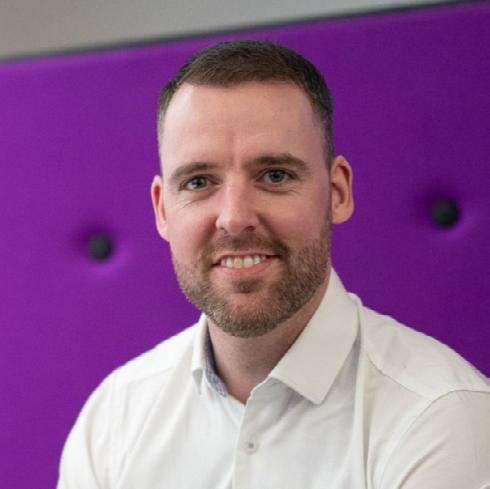
Calum Hayton was appointed as Treasurer, while Andrew Connelly and Paul Slorach are appointed as Chair and Vice-Chair roles respectively. Please join in support for those taking on the above roles.
The branch update was followed by talks from Ryan Gordon, Business Development Manager at National Subsea Centre, Richard Neilson, Director of National Decommissioning Centre and Moya Crawford, SUT President, providing an update on subsea technology roadmaps and initiatives.
The night was concluded with a light buffet and the chance to network, and a reminder of forthcoming local events. The Aberdeen Branch strive to plan and execute training, events and other initiatives of interest and benefit to its members. There is an open invite to those who feel they can provide a positive contribution to such activities. Please get in touch at aberdeen@sut.org.
1-2 February 2023 | Dave Brookes
Some 25 delegates from a broad range of industry attended the 4th virtual offshore renewable wind energy course run by the SUT on the 1st and 2nd of February 2023.
The course ran for two half days on the 1st and 2nd of February and once again the presentations were given by industry specialists from ORE Catapult, Marine Space, Cranfield University and BP.
There is increasing interest in floating offshore wind (FOW), and this was highlighted in the presentation given by BP’s Technical Leader.
The participants gave some interesting questions and feedback on the key issues including differences in the regional approach to surveys, construction and the role of offshore hydrogen production
as an alternative to electric power cables especially with longer distances and the move to HVDC compared to the shorter AC cable routes. Subsea substations were suggested as an alternative for floating substations for the deeper FOW farms.
The course was supported by presentations from long time SUT members Judith Patten, Steve Hall and Dave Brookes who once again coordinated the course
Consideration is being given to holding the next course as a longer in-person event based in the UK North East Wind industry hub to take in some of the world leading industry facilities in the area.

This is likely to be in early October this year so watch out for announcements as there are bound to be competition for the limited number of places available.


Click the icons above to follow SUT HQ on social media.



Join us on LinkedIn!

www.linkedin.com/company/sutuk/
Many of our branches and special interest groups also have social media accounts of their own. Make sure you search for ‘Society for Underwater Technology’ across LinkedIn to follow accounts dedicated to these groups too.

We’re looking for SUT member-written articles focussing on INNOVATION and on the BLUE ECONOMY
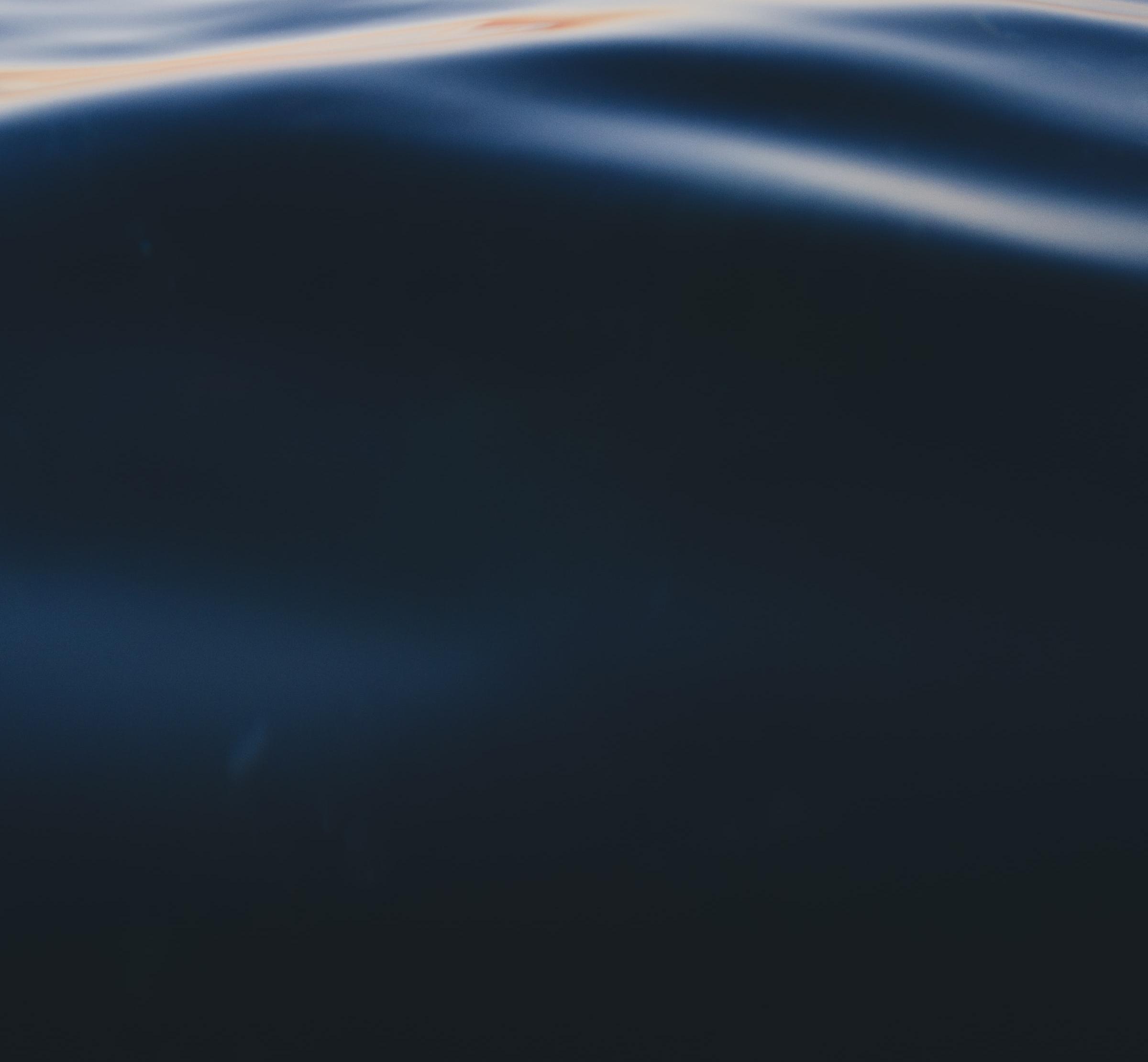
Additionally, if you are a corporate member and have a short update you’d like to include please contact Emily Boddy for details on how to get your company news included in the SUT newsletter.

Issues will be quarterly and can include:
• Welcome from the CEO
• Welcome to new Corporate Members
• Global Branch updates
• Special Interest Groups
• Spotlight article(s) on innovation
• Spotlight article(s) on the blue economy
• SUT News
• SUT Member news
• Young Professionals International
• Corporate Member updates
• Photo Galleries
• Members’ Only advertising
• Events/Training/Podcast
• SUT Member Benefits
• ...and much more...
We value our members and your contribution is very important to us at the SUT
If you would like to contribute to any of the above features, as an individual member or corporate member please contact Emily Boddy, SUT Communications & Publications Officer - emily.boddy@sut.org
NEXT issue June 2023
Deadline for submissions - 17th May 2023